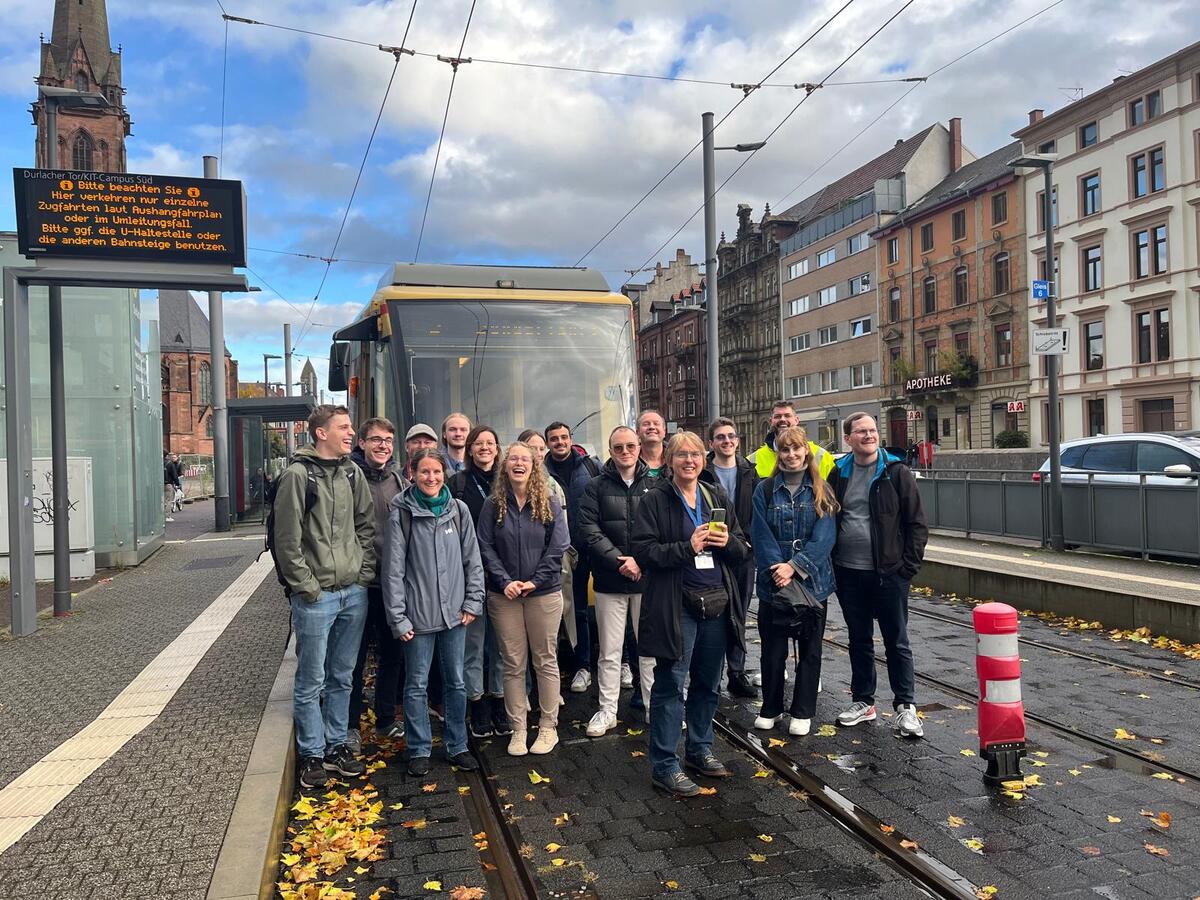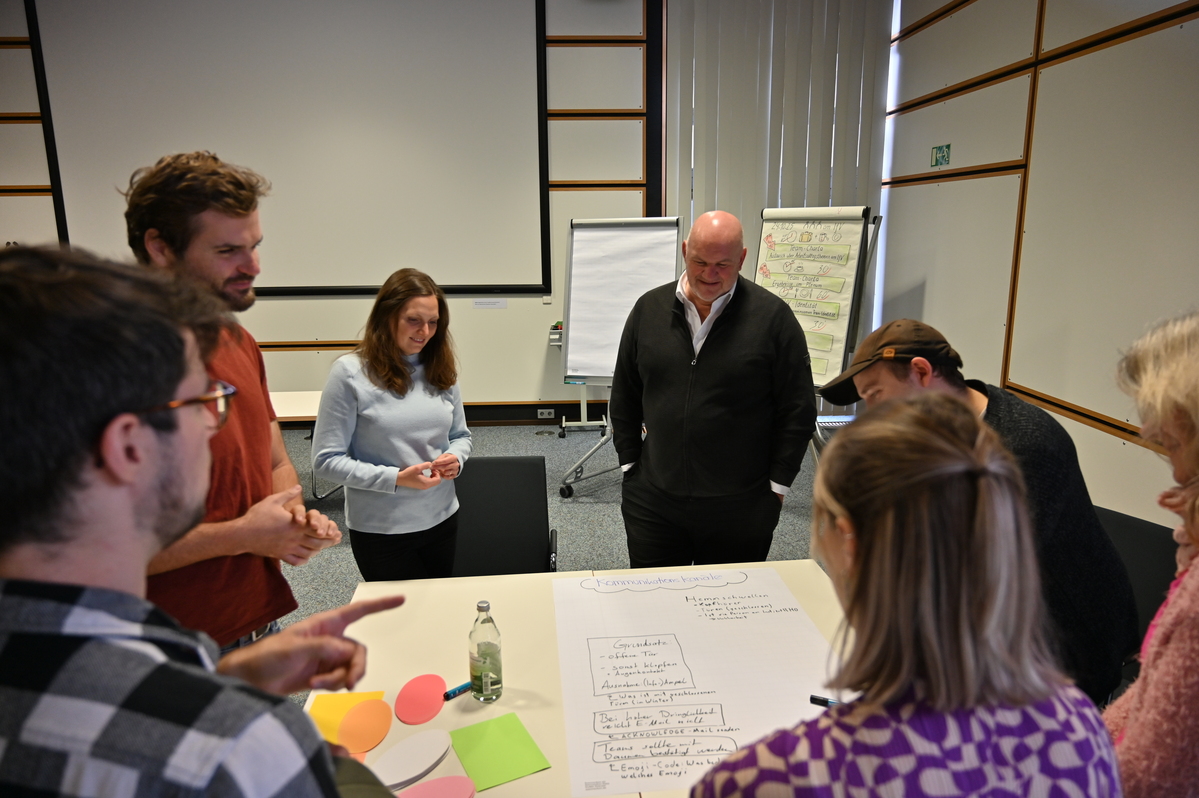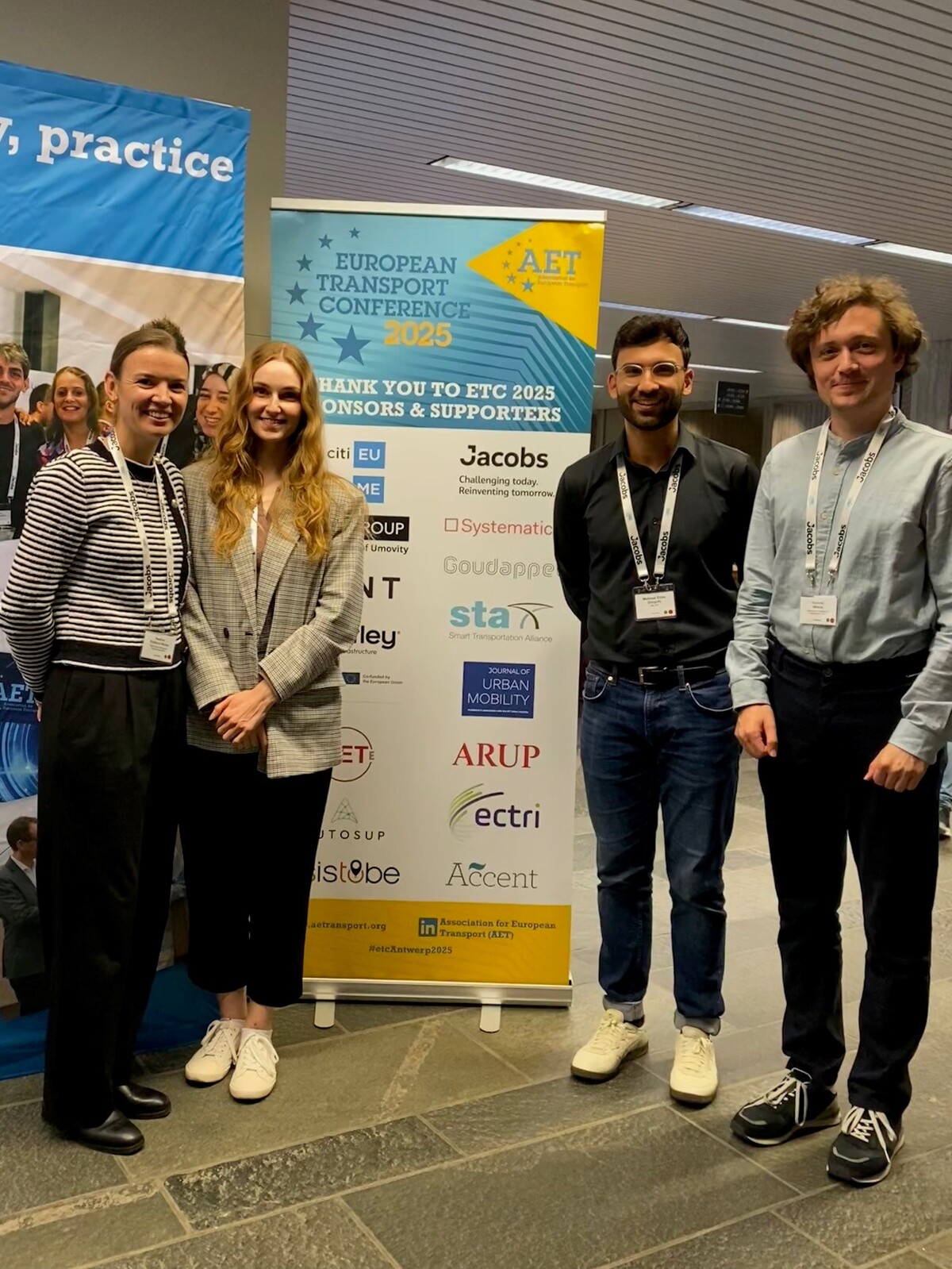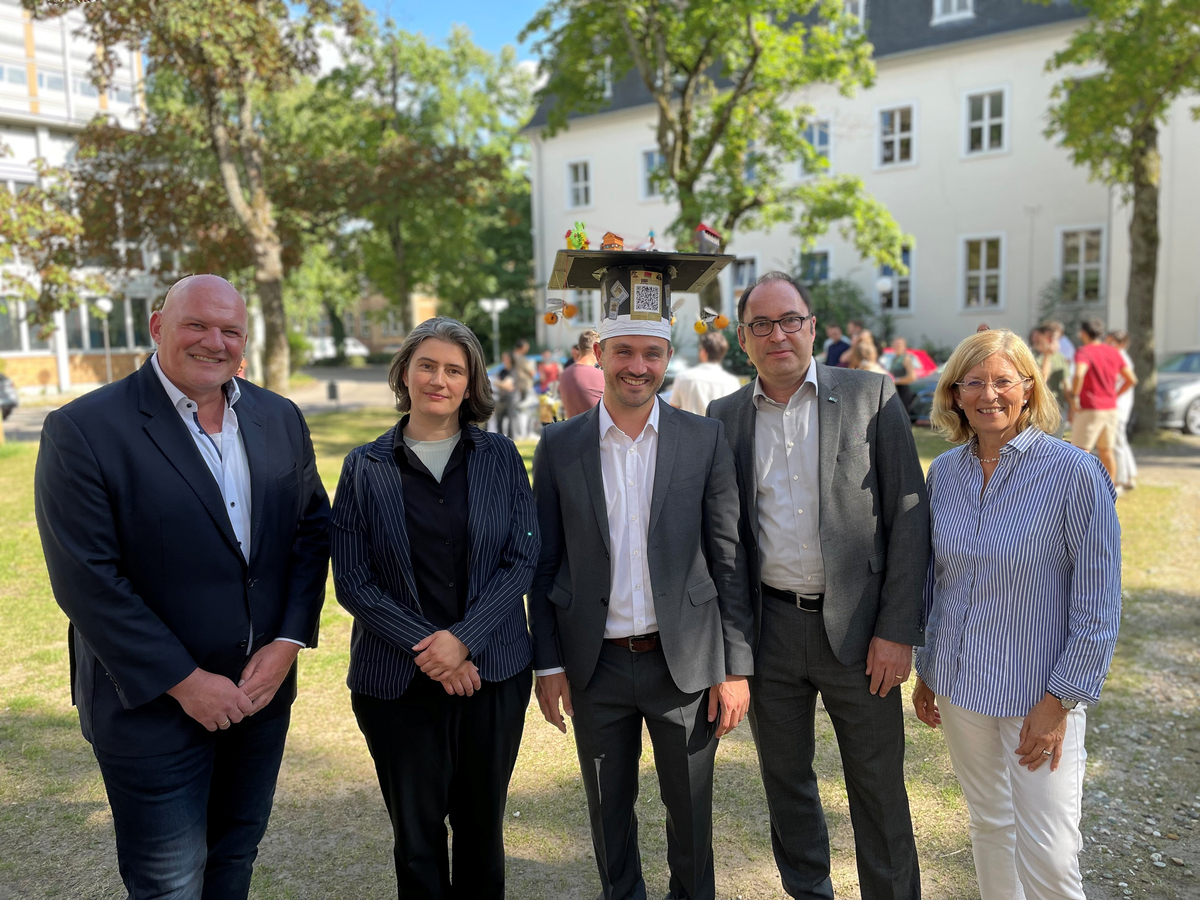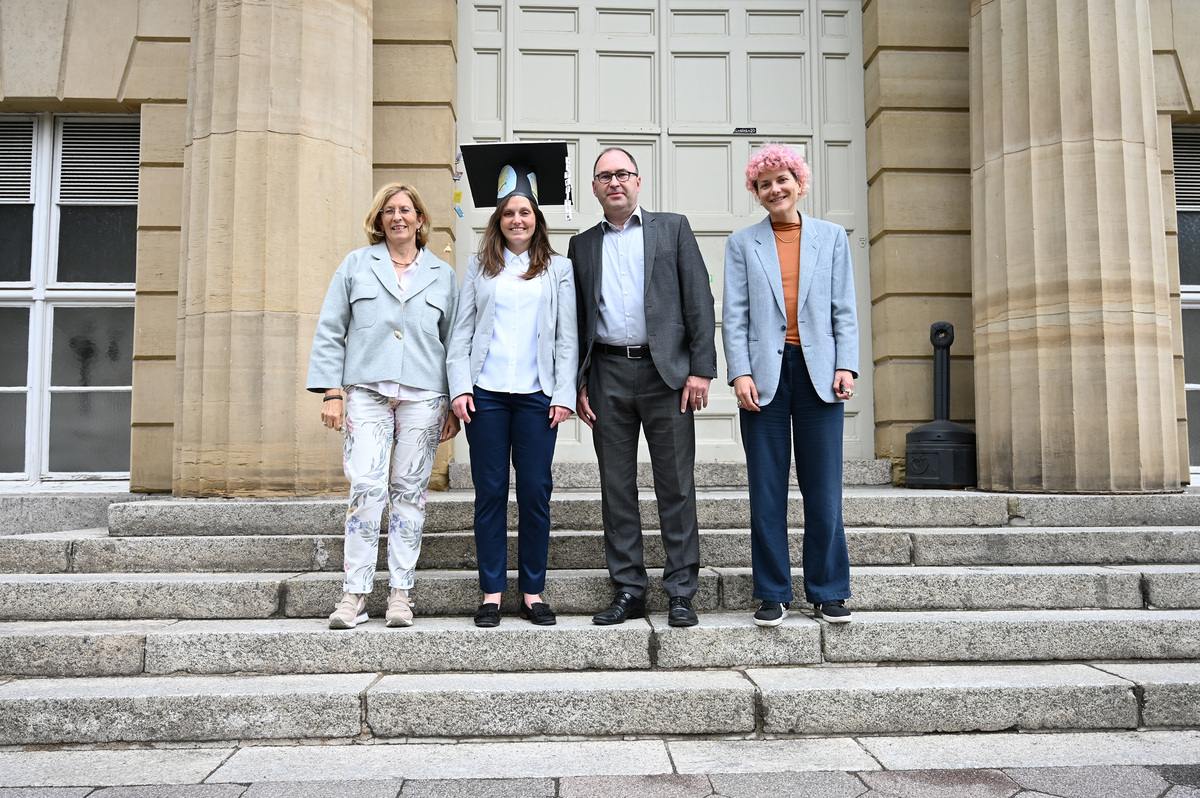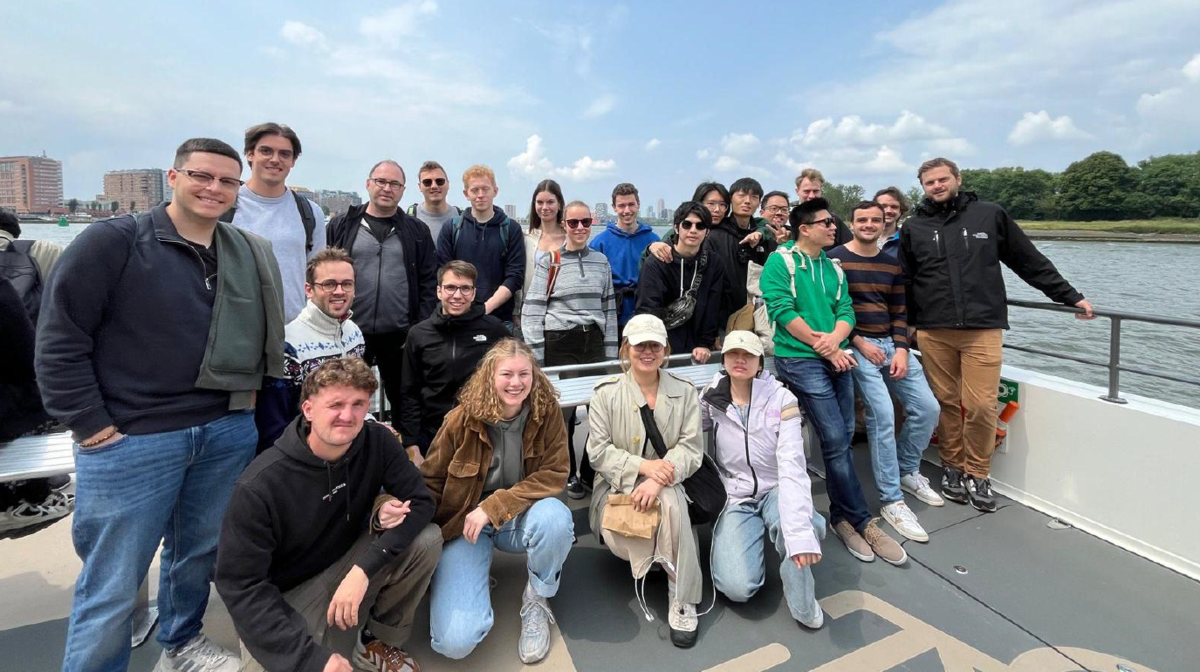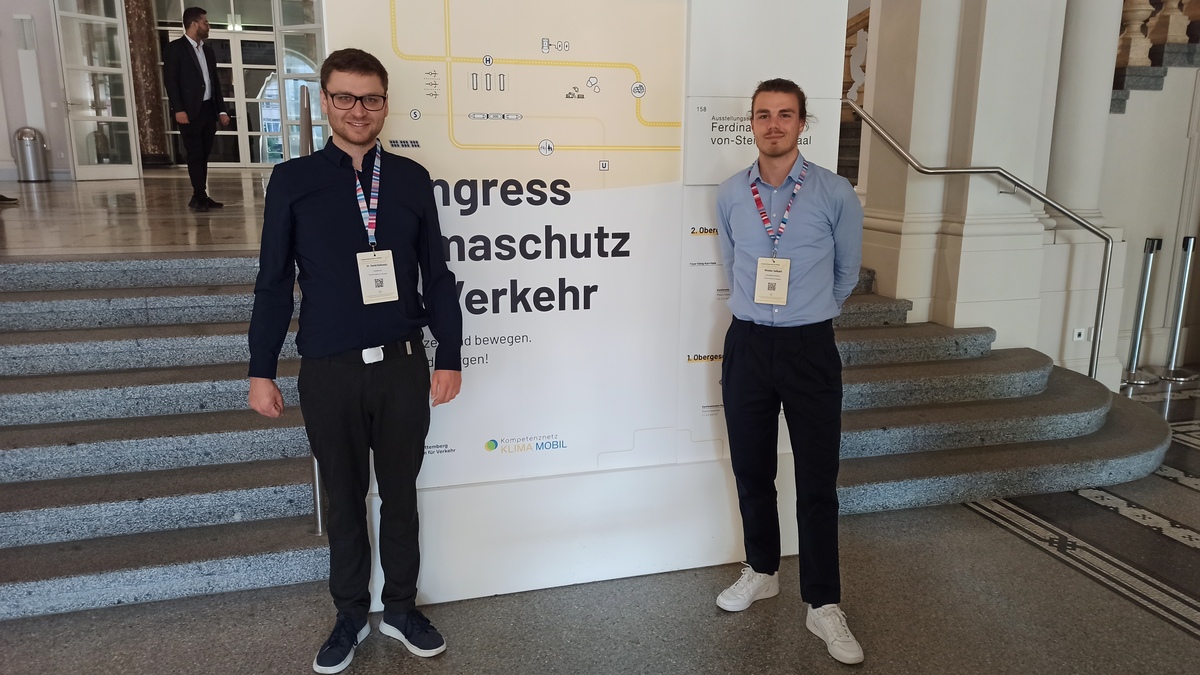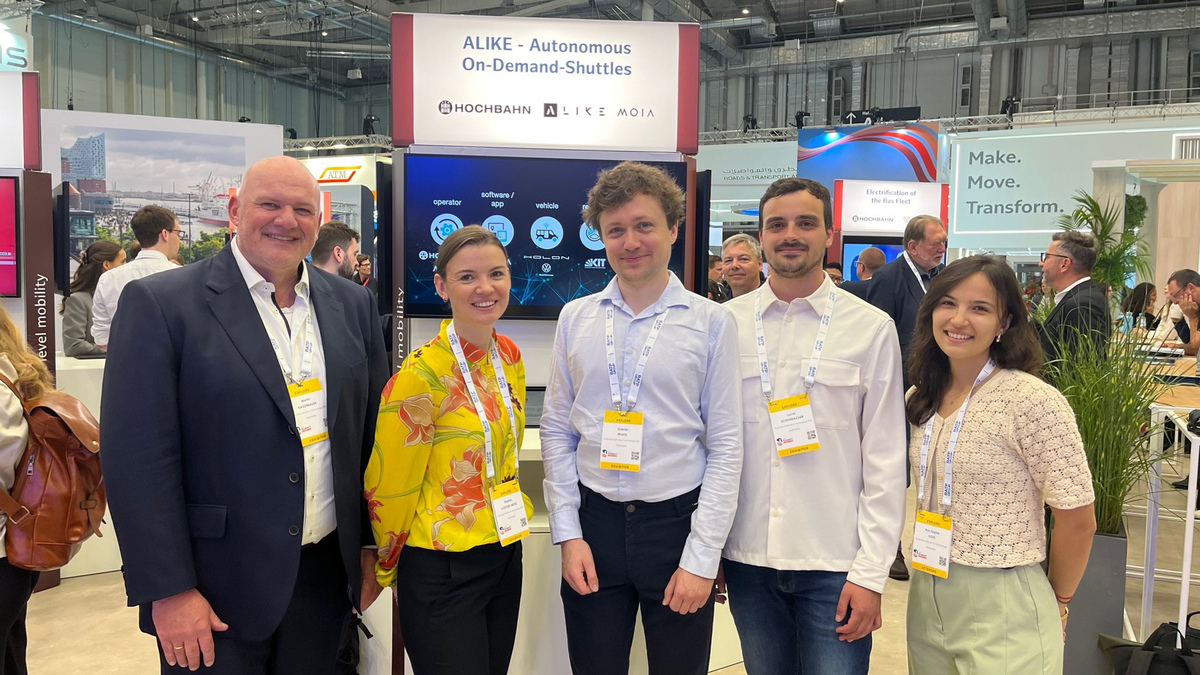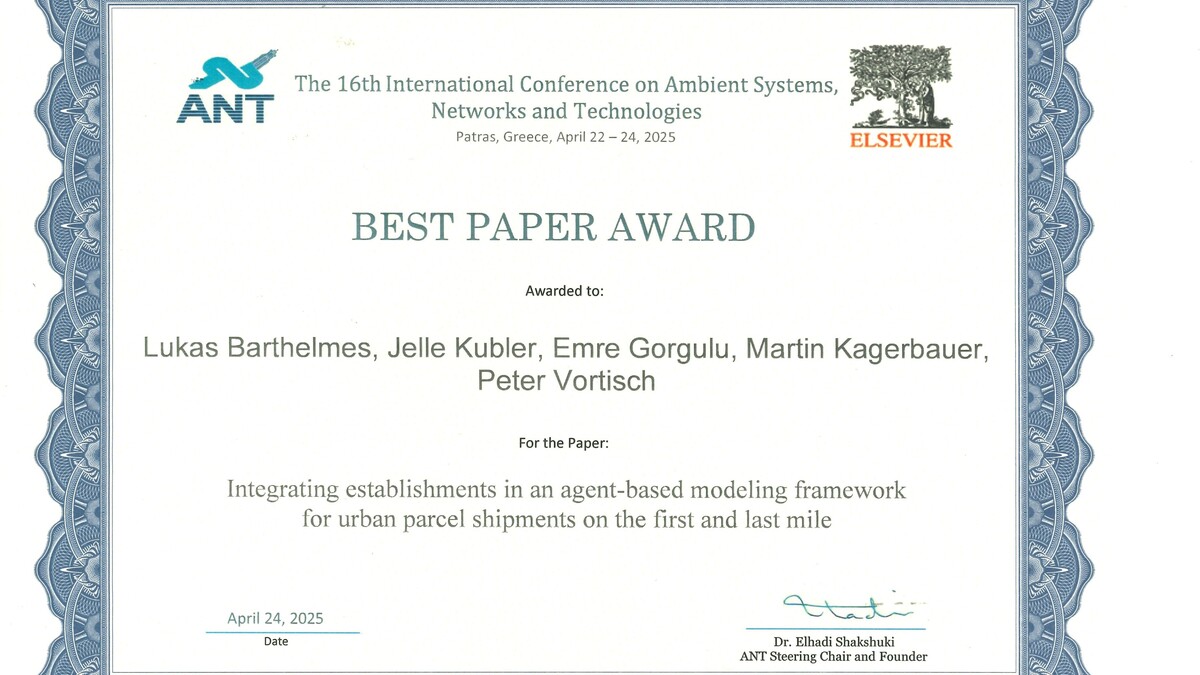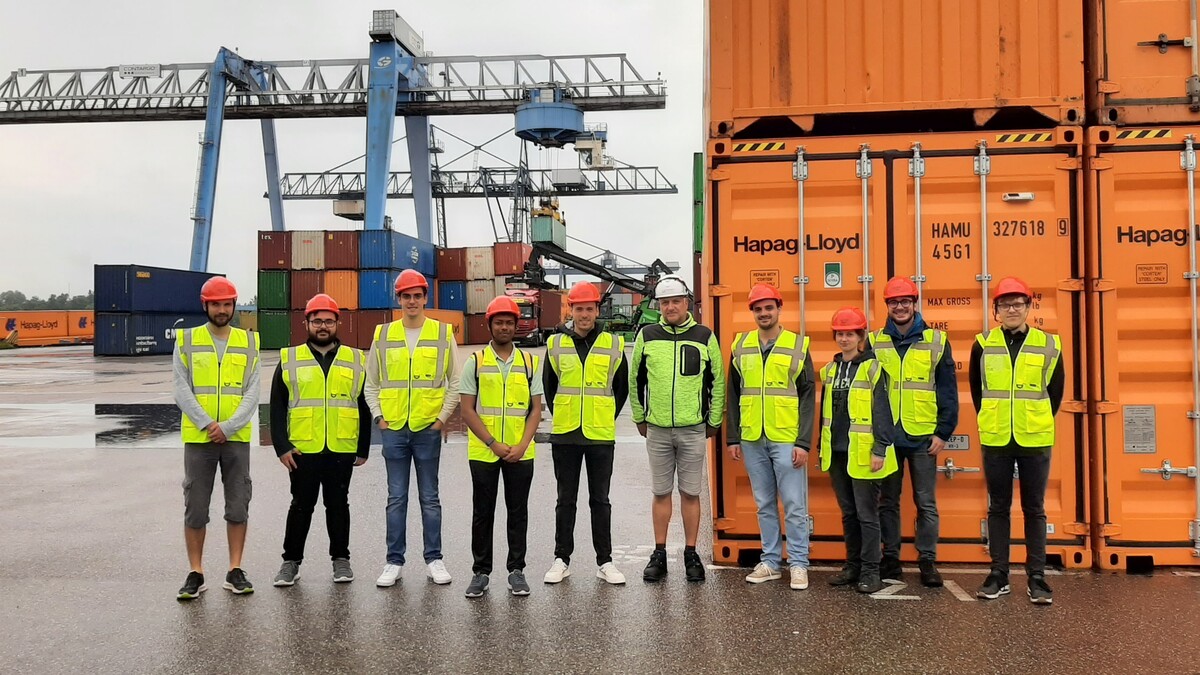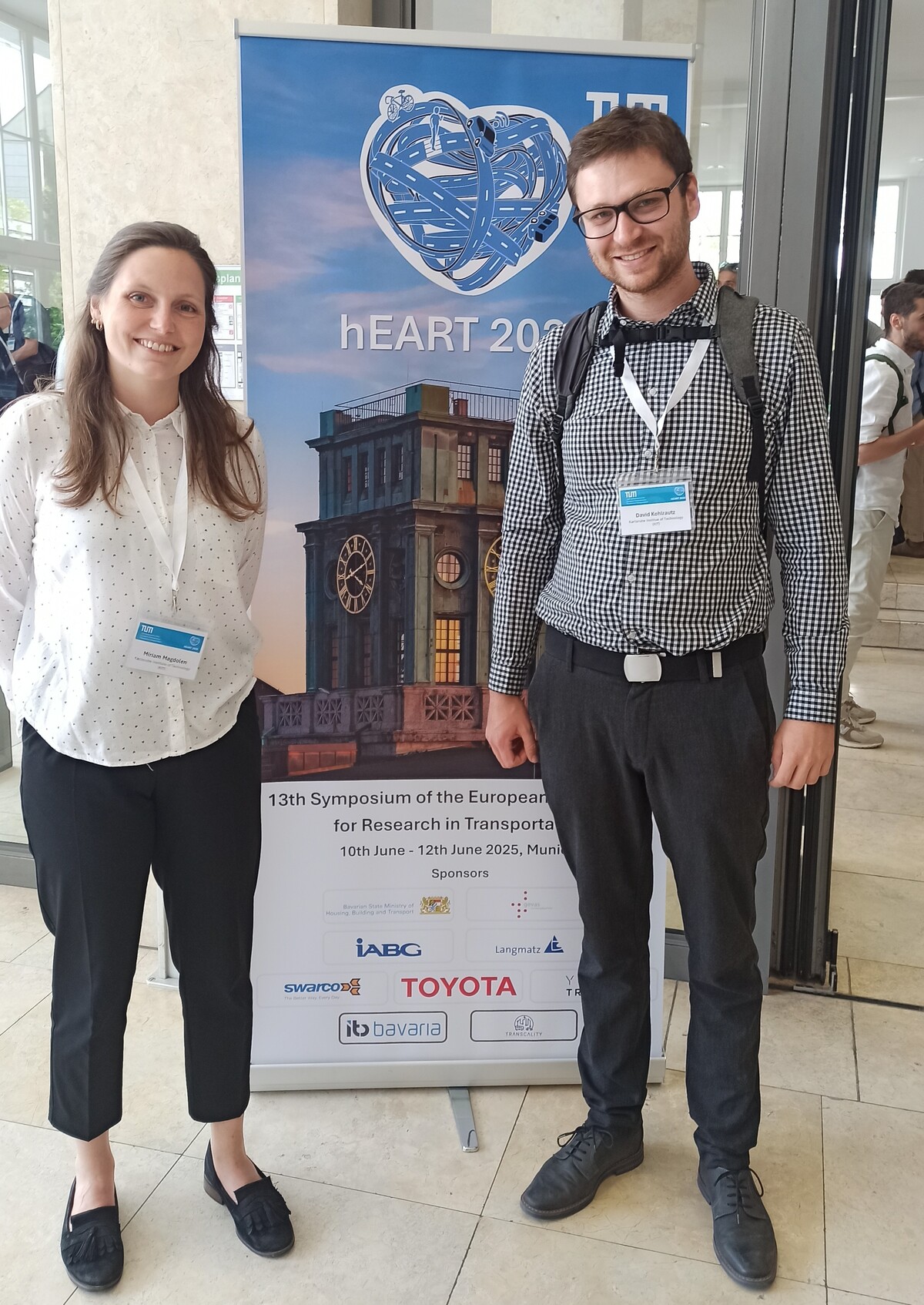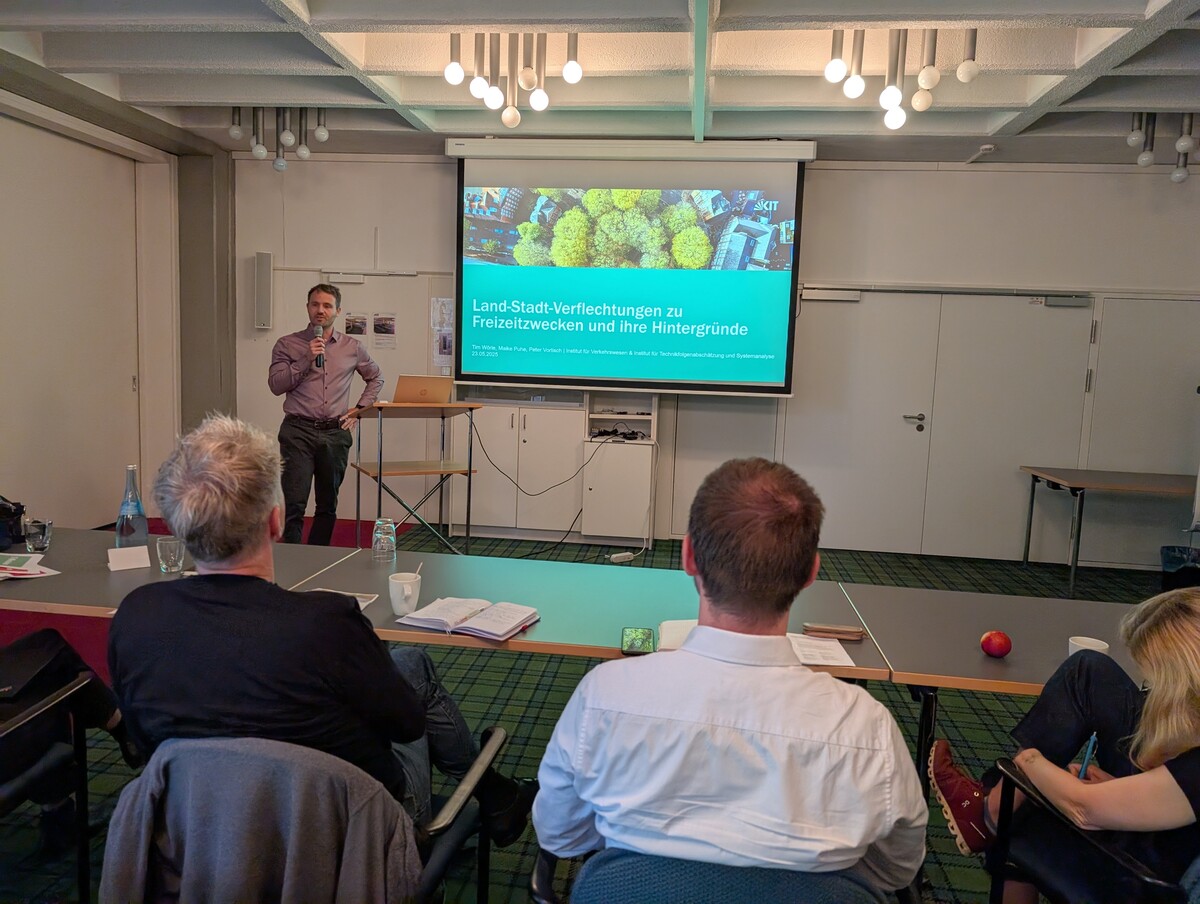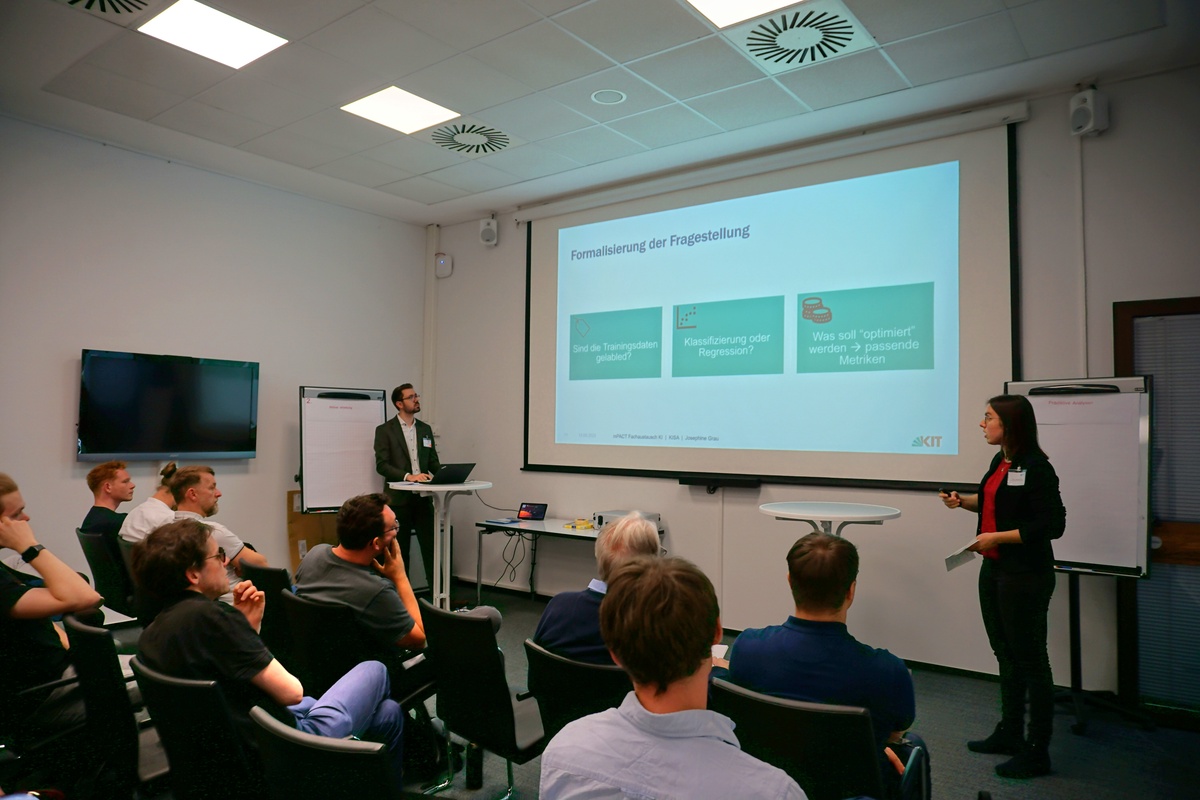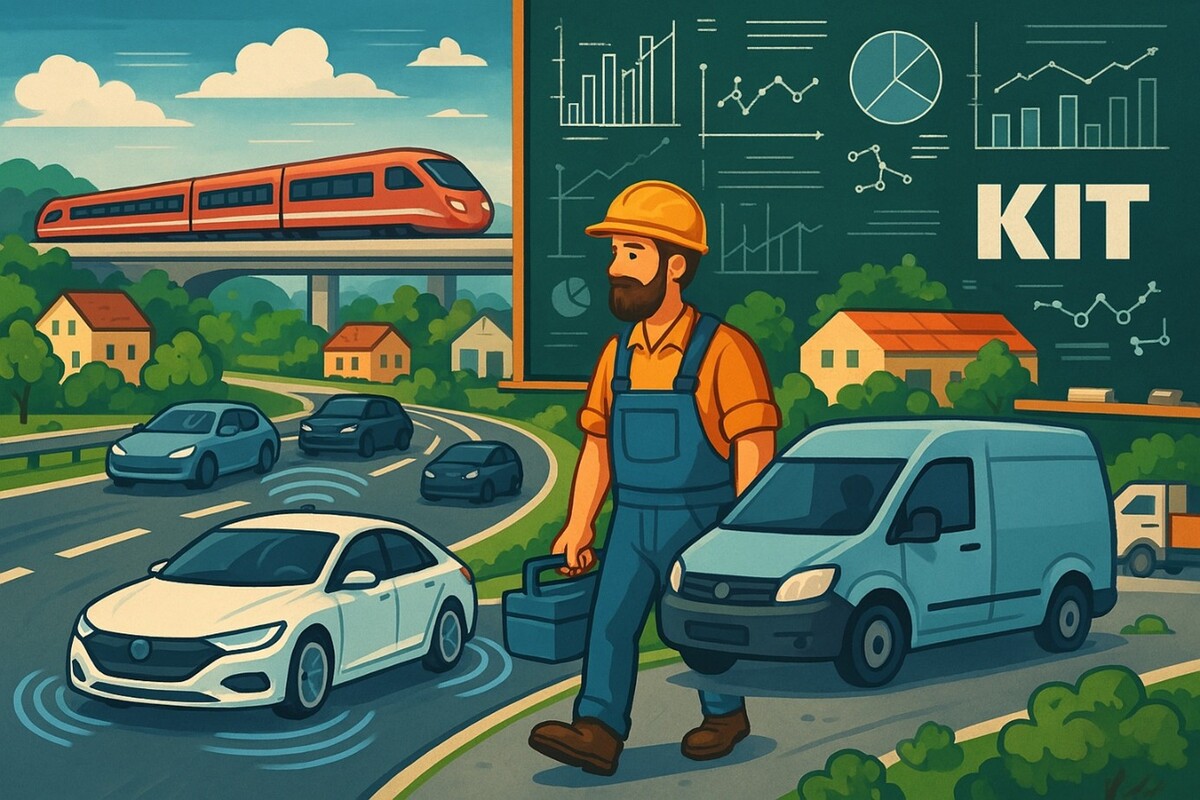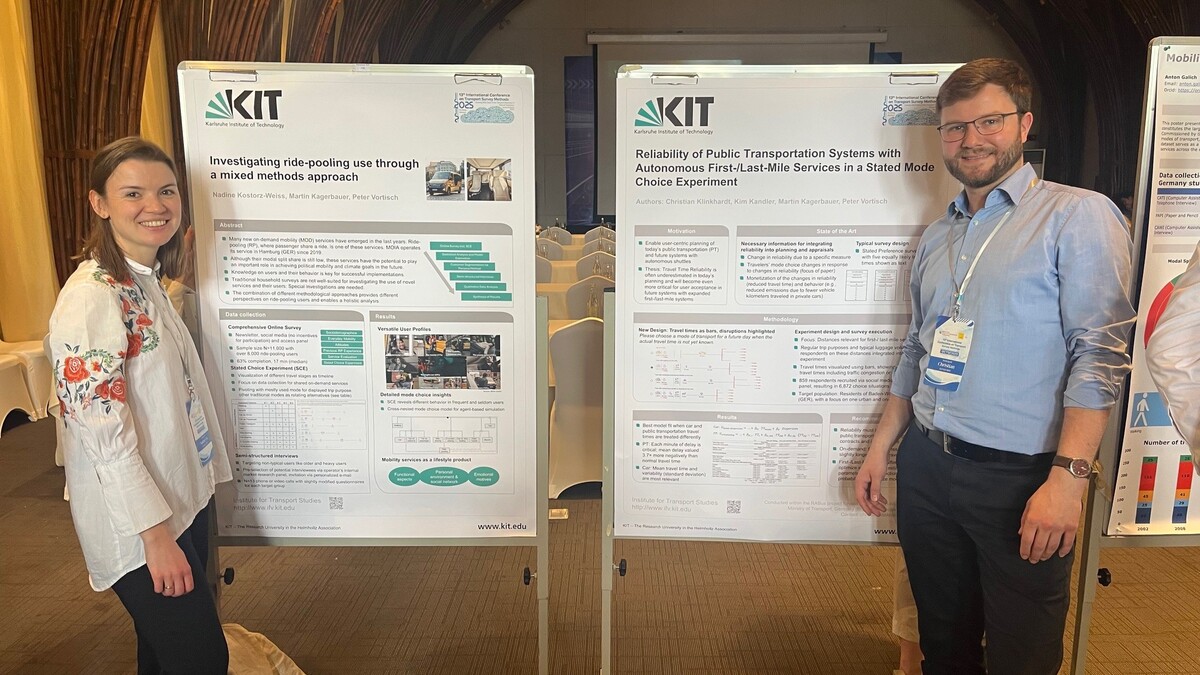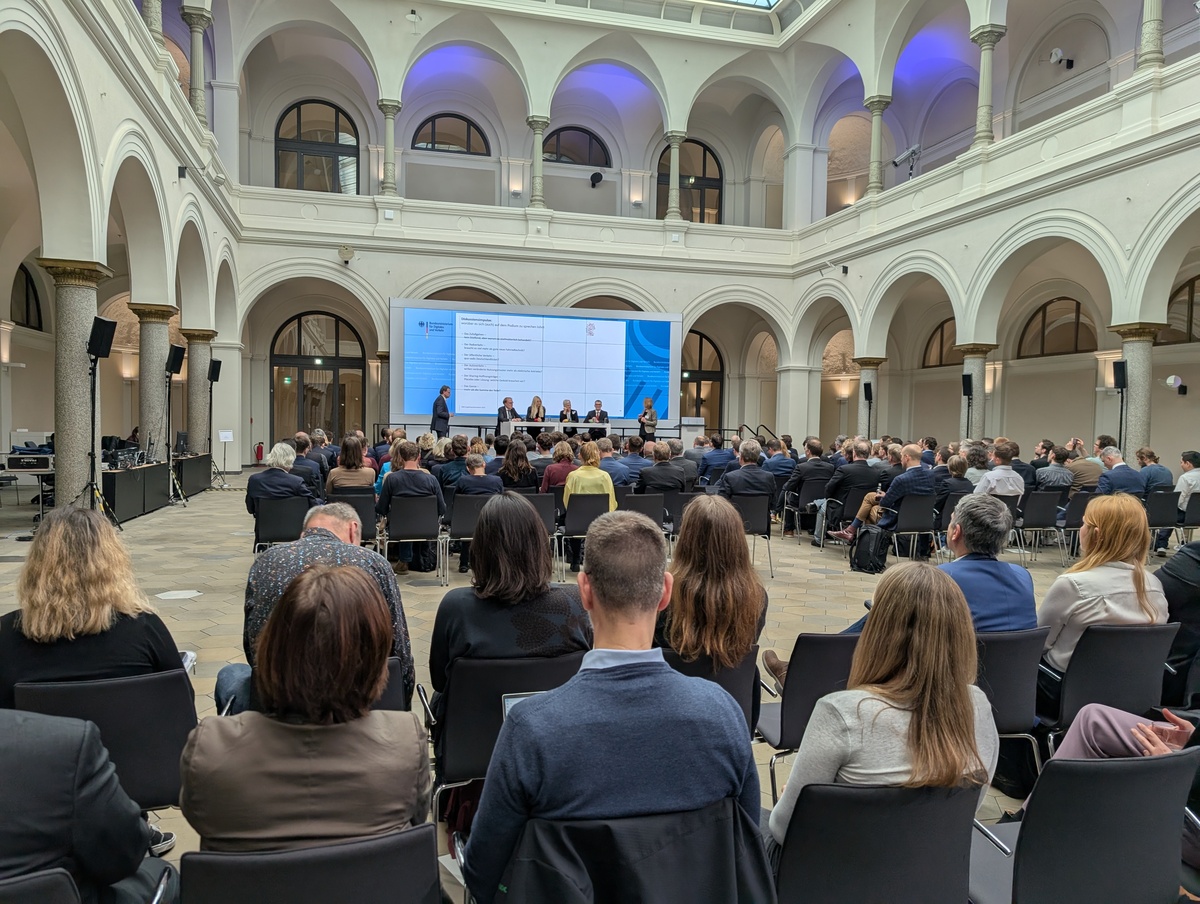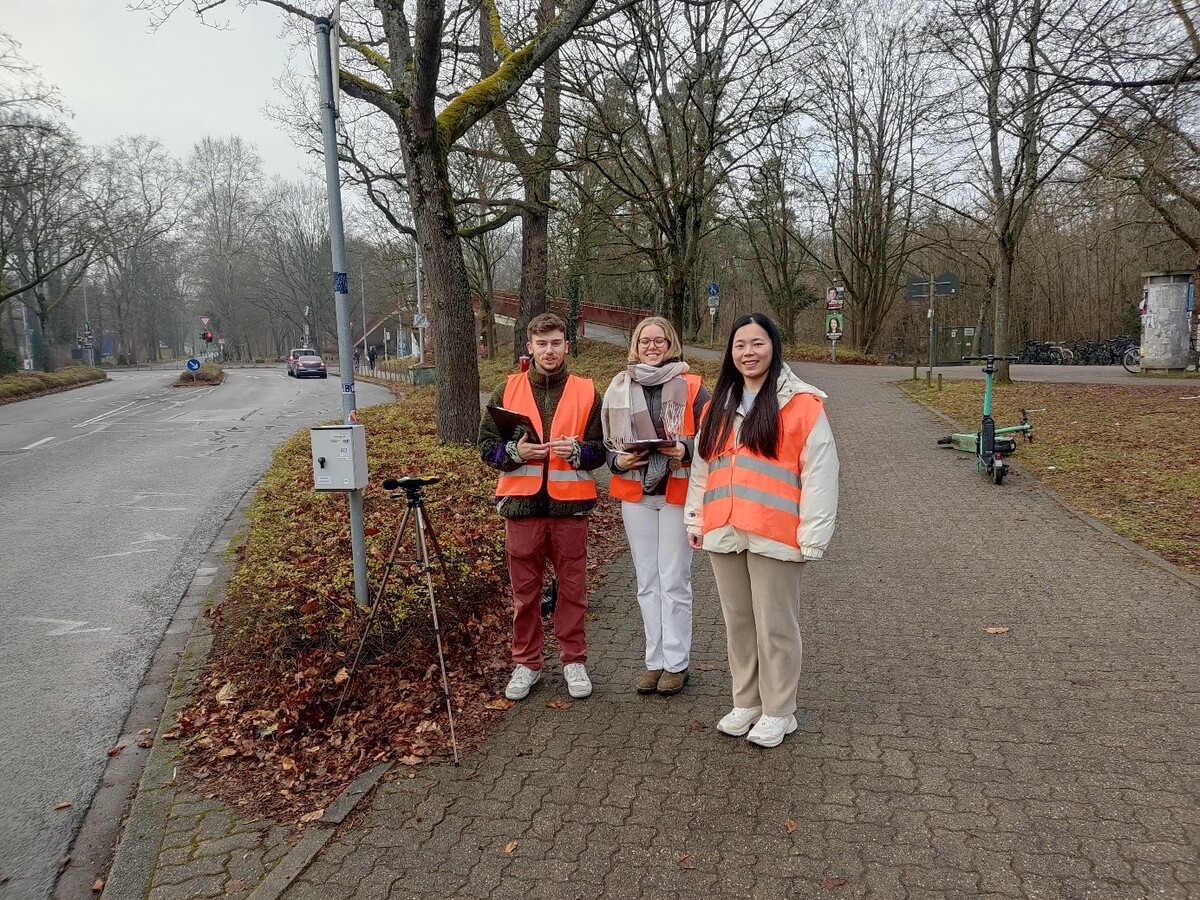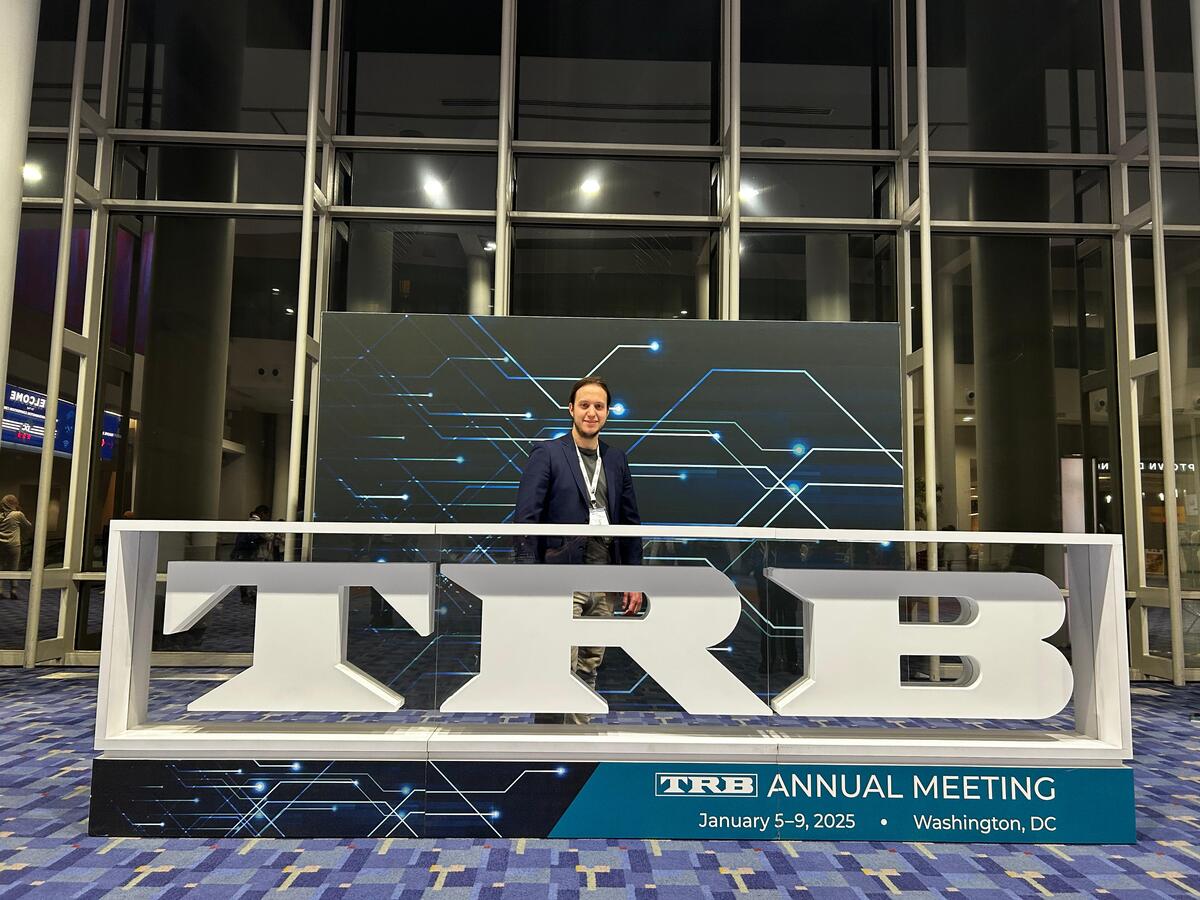Summer School 2025: Information Management for Public Mobility Services
This summer, as every year, the Institute of Transport, together with the VDV (Association of German Transport Companies), once again offered the lecture "Information management for public mobility services". Both students and employees from various transportation companies throughout Germany participated.
In exciting lectures and discussions with speakers from VBK, init, IVU, MENTZ, and DB, among others, central topics of local public transport were highlighted - from legal and organisational basics to transport planning and operational control, as well as IT systems that make mobility services possible in the first place.
The event was rounded off with practical insights and excursions, including to the init and VBK. A successful combination of theory, practice and professional exchange!
IfV Retreat 2025 – Shaping work culture
On October 23 and 24, 2025, we held this year's retreat at the Gernsbach Paper Center. Under the guiding theme of "IfV culture", we came together as an entire institute to explore our individual roles and joint collaboration at IfV in various exchange formats.
The focus was on questions of identity, collaboration and communication. In small groups, we reflected on what characterises our work at the IfV, which values and structures shape our cooperation, and how open and appreciative communication can further strengthen our team culture. An interactive workshop with Natalie Lenges (PEBA) provided additional impetus.
In addition to the substantive discussions, the conference also provided an opportunity for personal exchange. We ended the day in a relaxed atmosphere, enjoying bowling, billiards, and board games. We are now taking the new perspectives and inspiration with us into our day-to-day work at IfV.
European Transport Conference 2025 in Antwerpen
Four of our colleagues attended the European Transport Conference (ETC), held from 17 to 19 September 2025 in Antwerp. The ETC is a key annual event bringing together experts from research, practice and policy to exchange on current challenges and developments in the transport sector, with a focus on sustainable, inclusive and future-oriented mobility. In this context, our colleagues shared their work on the following topics:
Nadine Kostorz-Weiss presented findings on the acceptance of automated vehicles in public transport by older adults and individuals with impairments, based on results from the ALIKE project in Hamburg.
Kim Kandler shared insights from a survey exploring the perceived sense of safety among passengers in autonomous shuttles, particularly in relation to other riders. Using cluster analysis, she identified different types of potential passengers.
Emre Görgülü presented the results of the survey on e-commerce return behavior, providing an important foundation for modeling return drop-off trips and their integration into agent-based travel demand models.
Gabriel Wilkes presented an analysis on weather data for use in mobility behavior research. He demonstrated that using reanalysis data may provide better results than classical single weather station data.
Congratulations to our successful doctoral graduates
We would like to congratulate our two colleagues Miriam Magdolen and Tim Wörle on successfully completing their doctorates in quick succession!
Miriam wrote her dissertation on "An intrapersonal routine-based differentiation of long-distance travel from everyday travel", in which she investigated, among other things, methods that differentiate long-distance travel from everyday mobility based on the individual's familiar environment. Tim's doctoral thesis on "Stability and variability of destination choice decisions - modeling and simulation using the example of leisure travel" dealt with the patterns in which places are visited for leisure activities and how these can be mapped in a transport demand model.
Both degrees were celebrated with the entire IfV family at appropriate graduation ceremonies. In addition to the conviviality and good food, highlights of these celebrations include a performance by the IfV choir with a poem to the graduate, as well as a celebratory speech by Professor Peter Vortisch and the graduate himself. We wish Miriam and Tim all the best in their future careers and hope that they will stay with us for a while as postdocs and group leaders at the IfV.
Field trip to Rotterdam
This year's field trip of the Institute of Transport to the Dutch port city of Rotterdam took place from June 8 to 12, 2025. The excursion offered exciting insights into urban development, mobility, and international infrastructure projects - combined with a varied cultural program. You can read a detailed report with all the highlights here (in German). Many thanks to all the students for their keen interest, and many thanks to the organizing team for putting together such a great program!
Climate Protection in Transport conference
David Kohlrautz and Nicolas Salbach attended the Climate Protection in Transport conference in Stuttgart. The event, organized by the Baden-Württemberg Ministry of Transport and the Climate Mobile Competence Network, offered exciting presentations and discussions on topics such as transformation, parking space management, traffic-calmed town centers, and high-speed cycle connections.
Mobility Festival and UITP Global Public Transport Summit
Last week was all about the future of mobility, as Hamburg first hosted the Mobility Festival for the people of Hamburg and then the UITP Summit for industry players from around the world.
At the Mobility Festival, the IFV ran an interactive stand together with colleagues from the BVM-funded ALIKE project. Numerous visitors took the opportunity to learn more about autonomous driving and the project, ask questions, share their opinions on autonomous driving, and view the HOLON urban model. The ID Buzz AD from MOIA could also be inspected at the stand opposite. Both vehicles will be used in Hamburg city traffic in the future as part of the project. At the end of the day, we were overwhelmed by the positive response and the lively exchange.
Starting on Monday, several projects in which IfV is involved were presented at the UITP Summit. ALIKE and #transmove are two of the 17 lighthouse projects in Hamburg that demonstrate the breadth of the mobility transition. The vehicle from the #KIRA project could be inspected at the Deutsche Bahn stand. There was also a presentation on ZF's RABUS project. The German Center for Future Mobility (DZM) also had a stand, and the Karlsruhe TechnologyRegion stand provided information about the C2C Country-to-City-Bridge project.
We have our long-standing project partner, MOIA, to thank for two highlights: firstly, we were able to experience an impressive autonomous test drive through Hamburg's city traffic, and then attend the presentation of the new autonomous production vehicle ID.Buzz AD.
We would like to thank all our partners for the successful collaboration and are delighted with the many encounters with old and new faces.
Best Paper Award
We are very happy: Our paper "Integrating establishments in an agent-based modeling framework for urban parcel shipments on the first and last mile" was awarded the Best Paper Award at the 16th International Conference on Ambient Systems, Networks and Technologies (ANT 2025)! The conference, held from April 22 to 24, 2025, in Patras, Greece, brought together researchers from around the world to discuss current developments in the field of networked and intelligent systems. In our paper, published in Procedia Computer Science, Lukas Barthelmes, Jelle Kübler, Emre Görgülü, Martin Kagerbauer, and Peter Vortisch presented an agent-based model that explicitly considers businesses as active players in urban delivery and parcel traffic. The results show that if business actors are not considered in existing parcel demand models, the traffic effects of parcel traffic are significantly underestimated. The article also highlights how business-related specifics, such as fixed contracts between businesses and delivery services, significantly impact route efficiency and traffic volumes.
We would like to thank the jury for the award and are delighted that our research has been recognized! Click here for the paper.
Field trip to Contargo
As part of the "Freight Transport" lecture, our students visited Contargo's trimodal container terminal in Wörth on June 4, 2025 - and gained exciting insights into the practice of combined transport.
During a detailed tour of the site, the participants were able to get an idea of how containers are efficiently handled by rail, barge and truck. Particularly impressive: the dimensions of the terminal, the coordination of the modes of transport and the technical processes behind the handling process.
In addition to the tour, there was plenty of opportunity to ask questions - for example about current challenges in container transport, the role of digital systems and the importance of sustainable transport chains. Many thanks to Contargo for the interesting tour and the practical insights!
Coference hEART 2025
Two members of our institute, Miriam Magdolen and David Kohlrautz, attended in this year’s hEART 2025 conference at the Technical University of Munich. From June 10 to 12, lectures and poster sessions offered a wide range of insights into current research activities. The overall program provided room for engaging and inspiring discussions and included excursions, such as one to the Verkehrszentrum of the Deutsches Museum. Particularly valuable was the interdisciplinary exchange with colleagues from both academia and industry.
20th annual conference of the AK MoVe in Karlsruhe
Lisa Ecke and Tim Wörle participated in the 20th annual conference of the AK Mobility and Transport (AK MoVe) of the German Geographical Society (DGfG) on May 22/23, 2025, in Karlsruhe. The conference's motto was "Mobilität-Zwischen-Räumen: Neue Wege im Stadt(Um)Land" (Mobility in intermediate spaces: New paths in the urban and (surrounding) countryside). The conference was jointly organized by the Endowed Chair of Cycling at Karlsruhe University of Applied Sciences (HKA) and various institutes of the KIT (IfGG, ITAS, and IfV) as well as the Pegasus network, where Lisa Ecke provided support. Besides the exchange with other scientists, Tim Wörle gave a presentation entitled Rural-urban links for leisure purposes and their backgrounds, and Lisa Ecke led the poster session. The conference was concluded with an engaging panel discussion on the topic of "Perspectives for a Transport Transition in Rural Areas."
mPACT Expert Forum "Artificial Intelligence"
As part of the mPACT Artificial Intelligence 2025 expert forum on May 13 in Cologne, Josephine Grau presented the KISA project in the "AI models and algorithms" expert panel. In this project, neural networks and other machine learning methods are employed to efficiently simulate traffic control.
With approximately 80 participants, the expert exchange offered a lively platform for interdisciplinary dialogue and networking among experts from research, business, and administration.
Three DFG-Funded Research Projects at the Institute for Transport Studies
Last year, the Institute for Transport Studies (KIT) was pleased to receive funding approvals for three research projects supported by the German Research Foundation (DFG). These projects allow us to address current research gaps in the fields of traffic engineering, transport modeling, and mobility research.
The research group MiRoVA (Migration of Road Vehicle Automation) investigates the transition from human-driven to fully automated road transport. Research on the project is conducted by Marvin Baumann.
The project titled Integration of commercial passenger trips into an agent-based travel demand model aims to model and quantify travel demand induced by physical services. Empirical surveys conducted with households and firms, particularly in service-intensive sectors such as the skilled trades and home-based healthcare service, are used to examine demand characteristics and service allocation mechanisms. Based on this data, models will be developed to enable differentiated analyses of the transport implications of the service sector, accounting for demand-side heterogeneity and macroeconomic fluctuations. For further information, please contact Emre Görgülü.
The third project is titled Long-Distance Travel as a Supplement to Everyday Mobility – Mapping Individual Travel Behavior in an Extended Longitudinal Perspective. This project investigates and models passenger travel demand in Germany, focusing on long-distance travel and its interaction with everyday mobility. By merging various data sources on mobility behavior and conducting a supplementary survey, the goal is to represent individuals’ total mobility across an entire year. Responsible for this project is Miriam Magdolen.
All three projects have now entered the working phase. We are excited to contribute to fundamental research in the field of transport and mobility!
ISCTSC 2025
The Institute for Transport Studies is pleased to have participated in the 13th International Conference on Transport Survey Methods, which took place this year in Da Nang, Vietnam.
Under the motto "Covering Blind Spots of The Transport Datascape in Times of Turbulence", experts from all over the world discussed current developments and associated challenges in surveys in the transport sector.
The conference was a very good opportunity for us to present current research work to the international community. We would like to thank you for the lively scientific exchange during the entire conference!
Kick-off meeting of the DFG research unit MiRoVA
On March 28, 2025, the joint kick-off meeting of the DFG research unit MiRoVA (Migration of Road Vehicle Automation) took place at RWTH Aachen University. Organized by the Institute of Ergonomics at RWTH Aachen University, the meeting provided a good opportunity to jointly develop initial approaches, coordinate collaborations and plan the next steps in the project.
As part of MiRoVA, we are working with colleagues from RWTH Aachen University, TU Darmstadt and TU Munich to investigate the transition from human-guided to fully automated road traffic. In addition to the technical integration of (partially) automated vehicles into the traffic system, we are focusing in particular on the human-centered perspective of interaction and cooperation with different automation variants.
Our sub-project at the Institute for Transport Studies (IfV) at KIT, represented by Marvin Baumann and Peter Vortisch, is concerned with the investigation of these migration processes using microscopic traffic flow simulation. The aim is to integrate behavioral models from the other sub-projects and to analyze how different automation paths affect the traffic flow and the overall system.
Many thanks to Frank Flemisch, Michael Preutenborbeck and Paul Weiser for the successful organization of the meeting. We look forward to hosting the first MiRoVA Hot Topic Seminar in Karlsruhe in July and continuing the professional exchange.
Project closing events of SrV 2023 in Dresden and MiD 2023 in Berlin
Current data on everyday travel is important for transport planning and policy. With the end of the German Mobility Panel (MOP) in 2022, an important survey in Germany about travel statistics has come to an end. The Regional Mobility Indicators (ReMo) project aims to provide a continuous monitoring tool for cities in the trans-European networks at the regional level by combining innovative and up-to-date data sources to fulfill EU reporting obligations. For this, up-to-date input data on everyday travel will be essential. It was therefore important that Miriam Magdolen informed herself about the current results and findings of Mobility in Cities (SrV) and Lisa Ecke and Jan Vallée about Mobility in Germany (MiD) on March 25 and 26, 2025, at the respective project closing events. The events also provided an opportunity to discuss innovations, current trends, and developments in the survey world with the community. The findings can be incorporated into future surveys at the IfV and put to good use.
Invitation to the Kick-Off Event of the project KISA
Freeway Control Systems improve safety and traffic flow on highways by displaying dynamic speed limits, overtaking bans and warnings. However, the integration of these systems into traffic flow simulations has so far involved a great deal of effort. This is where the project KISA (AI-based generation of a digital twin of freeway control systems) comes in. The aim is to efficiently integrate route control systems into simulations and thus facilitate their research and optimization.
The official kick-off event will take place online on 28.02.25 from 2 to 3 pm. Interested parties can register by e-mail. The content of the kick-off event is the presentation of the planned project content, as well as space for questions and exchange.
We look forward to your participation!
Trip to the art fair "art Karlsruhe"
On February 19, 2025, the women of the IfV had the opportunity to take part in an exclusive event organized by the Women in Mobility Baden network and to explore the art Karlsruhe art fair in advance.
In addition to the valuable exchange and networking with other women from the industry, a personal guided tour through the diverse art exhibitions with a focus on moving art and mobility was an absolute highlight.
We look forward to further opportunities for exchange within the community!
Laboratory Internship at IfV
As part of the laboratory internship, students gained practical insights into the processes of sound level and traffic measurement at the Institute for Transport Studies. Working in small groups, they set up sound level meters and side radar devices at various measurement locations to investigate the relationship between traffic noise and other noise sources, as well as their effects. In addition to the data automatically recorded by the measuring devices, manually collected data from the measurement logs was also analyzed and evaluated in a subsequent session using Excel and a simple sound simulation. This approach provided students with a valuable introduction to the critical phase of data evaluation and interpretation. The results, along with photo documentation of the measurement procedure and experimental setup, were compiled into an experimental report to familiarize students with the principles of scientific documentation.
TRB 2025
Our post on LinkedIn about the TRB Meeting in Washington looks a bit different this year: Instead of being represented by 10 to 15 people as in previous years, only Marvin Baumann will represent us at this outstanding conference in 2025.
The reason for this decision is that we cannot credibly research sustainable mobility and explain to our students that long-distance travel – especially by airplane – is particularly harmful to the climate while flying across the Atlantic with half of our institute at the same time. Therefore, we are consciously reducing our participation in conferences outside Europe – even though this comes with a considerable dose of fear of missing out, and we will especially miss meeting all our international fellow researchers at our Wednesday evening reception.

